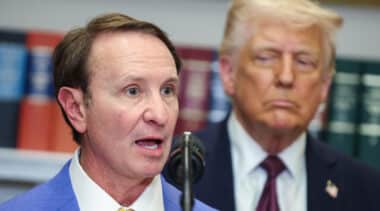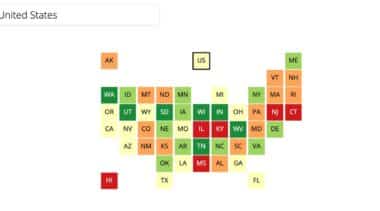Zachary Christensen is a managing director of Reason Foundation's Pension Integrity Project.
Christensen’s work with Reason's Pension Integrity Project aims to promote solvent, sustainable retirement systems that provide retirement security for government workers while reducing long-term costs for taxpayers and employees. Zachary and his team provide education, reform policy options, and actuarial analysis for policymakers and stakeholders to help them design practical and viable reform proposals.
The Pension Integrity Project has provided technical assistance to several successful pension reform efforts in recent years, including in Michigan, Colorado, Arizona, South Carolina, Texas, and other states tackling persistent pension solvency challenges.
Christensen has contributed to in-depth solvency analysis of the Arizona PSPRS, Arkansas TRS, Louisiana TRSL, Texas ERS, and Texas TRS pension plans.
Christensen's work has been published in the Los Angeles Daily News, Orange County Register, NJ.com, Colorado Politics, and many other publications. He has also been featured in the Carolina Journal and the Michigan Capitol Confidential. His research has been published by the Hoover Institution, The Platte Institute, Texas Public Policy Foundation, and Rio Grande Foundation.
Prior to joining Reason Foundation, Christensen was a pension finance analyst at Stanford University’s Hoover Institution, where he worked on widely-cited research on the funding status and accounting methods for public sector retirement systems.
Christensen holds an M.S. in Public Policy from Pepperdine University and a B.S. in Political Science from Brigham Young University.
-
House Bill 78 would expose Alaska to billions in additional costs
House Bill 78 could cost Alaska's taxpayers more than $7 billion in the coming decades.
-
Alaska’s defined contribution plan is a better benefit than a pension for most state public workers
State policymakers should keep the defined contribution plan open as an option for those who would like to take advantage of its inherent advantages.
-
Pension Reform News: Public pension reform drives fiscal responsibility, not inequality
Plus: How property tax cuts will impact pensions in Texas, Louisiana's pension crisis threatens taxpayers, and more.
-
Restoring the Florida Retirement System’s COLA would increase pension costs, risk
State policymakers should look beyond best-case scenarios when evaluating the restoration of a cost-of-living adjustment.
-
Pension Reform News: The political push for Connecticut’s pensions to invest in the WNBA
Plus: San Diego pension debt drives taxes and fees on residents, pensions are a major contributor to state and local government debt, and more.
-
California’s state and local pension plans have over $265 billion in debt
California’s public pension plans are taking on more risk than other pension systems while generating relatively poor investment return results.
-
Pension Reform News: Reason analysis shows debt drives the rise in pension costs
Plus: Ohio bill would advance shared pension responsibility, Florida has decades to go before fully funding benefits, and more.
-
Florida must stay the course to pay for promised pension benefits
Florida’s retirement system for public workers is estimated to be 17 years away from eliminating expensive pension debt.
-
Pension Reform News: Reason’s annual report finds $1.5 trillion in aggregate pension debt
Plus: Undoing California's pension reforms could cost billions, what government worker reductions mean for pensions, and more.
-
Ohio House Bill 473 could fix public pension plan contributions
House Bill 473 would ensure that pension contributions are transparent and in line with the goals of shared responsibility.
-
Ohio lawmakers consider bill to promote an independent childhood
Senate Bill 277 would assure parents that they can let their children engage in safe, reasonable activities without mandated adult supervision.
-
Assembly Bill 1383 brings back major pension costs for California
The bill rolls back crucial elements of the landmark PEPRA reform, which would result in billions in extra costs imposed upon California taxpayers.
-
How government workforce reductions can impact public pension debt
Public pension plans need to lower their payroll growth assumptions or transition to a method that is less sensitive to payroll fluctuations.
-
Pension Reform News: How to properly structure a cash balance plan for public workers
Plus: Recommendations for Mississippi's Public Employees Retirement System, evaluating Oklahoma's defined contribution options, and more.
-
Pension Reform News: Public pensions struggle to meet return assumptions
Plus: California recruits and retains public workers without adding pension benefits, proxy voting undermines public pensions' responsibility to taxpayers, and more.
-
Pension Reform News: Model legislation for modernized defined contribution retirement plans
Plus: Louisiana's teacher pension system needs reform, research shows public employees are not underpaid, and more.
-
Pension Reform News: Updated report on pension debt
Plus: Threats to California's pension debt elimination plan, lawmakers should not use Colorado's pension for police funding, and more.
-
With additional plans reporting, total unfunded public pension liabilities in the U.S. grow to $1.61 trillion
Information added to the Annual Pension Solvency and Performance Report finds the median funded ratio across public pension plans decreased marginally to 75.8%.


















